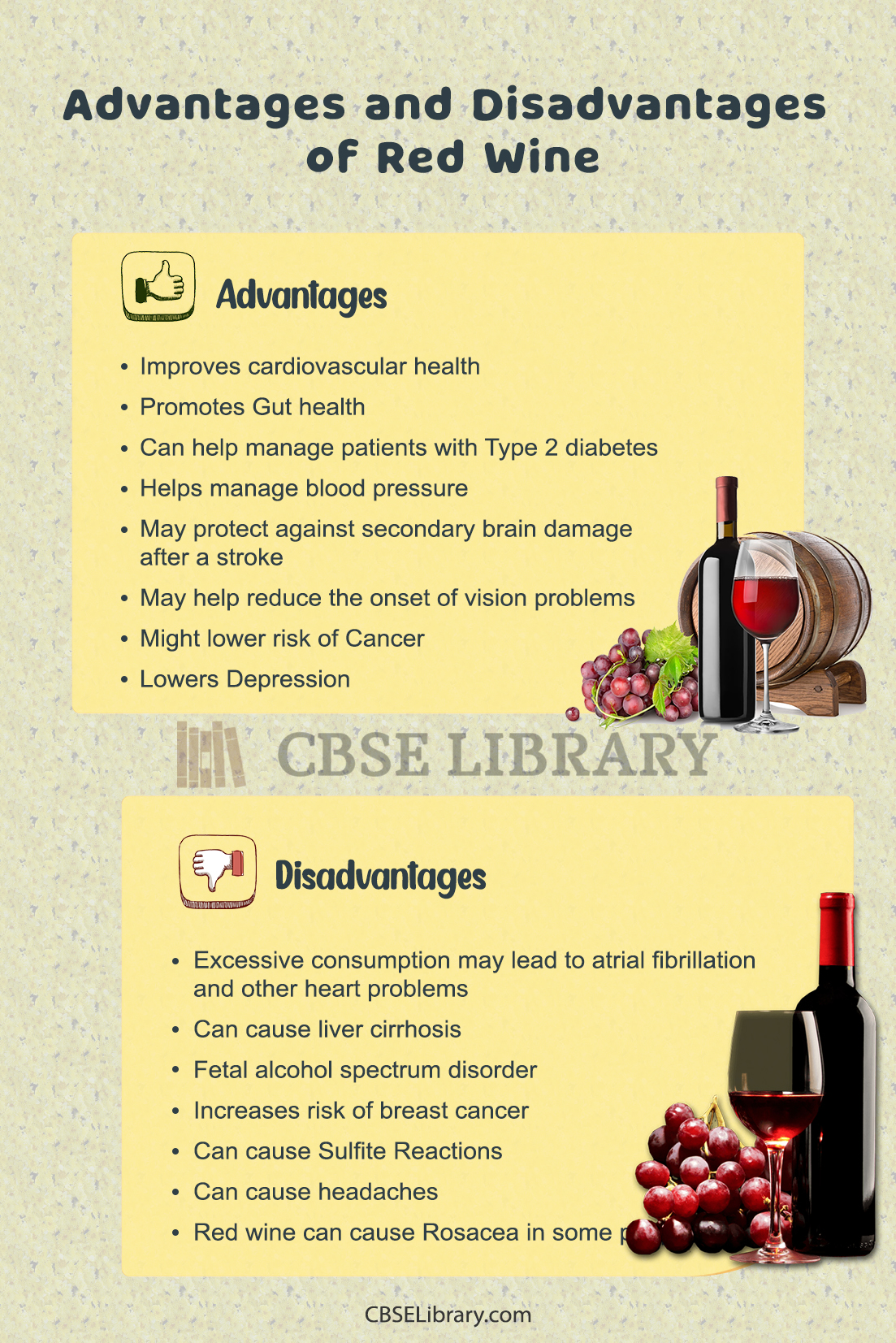Advantages And Disadvantages of Red Wine: Red wine is a fermented alcoholic drink made from the dark-colored grape skins, pulp, and seeds of red grapes. It has been around for hundreds of years and is one of the most popular types of wine in the world. Some advantages of drinking red wine are that it has antioxidants that can help protect the body against cancer, heart disease, and other diseases. Additionally, red wine can help improve blood flow and circulation. Red wine also contains resveratrol, which helps to prevent aging and diseases such as heart disease, stroke, and Alzheimer’s.
However, red wine also has some disadvantages. For example, red wine can contain high levels of tannins, which can irritate the stomach and cause heartburn or constipation. Additionally, red wine may contain alcohol levels that are higher than other types of alcohol. This can lead to impairments in coordination and judgment while intoxicated. In this article, we shall look at how red wine has evolved throughout history, including its different types as well as its potential advantages and disadvantages in detail.
Students can also find more Advantages and Disadvantages articles on events, persons, sports, technology, and many more.
- Advantages of Red Wine
- Disadvantages of Red Wine
- Comparison Table for Advantages and Disadvantages of Red Wine
- Conclusion on Red Wine – Advantages And Disadvantages
- FAQs on Advantages And Disadvantages of Red Wine
Advantages of Red Wine
One of the main advantages of red wine is that it has been shown to improve heart health. Studies have shown that individuals who drink red wine regularly have a reduced risk of developing heart disease compared to those who do not drink red wine. Other important advantages of red wine are as follows:
- Improves cardiovascular health – Red wine can be beneficial to cardiovascular health. It has anti-platelet aggregation properties that reduce the risk of blood clots and promote cardiovascular health by reducing the risks of heart attacks, strokes, coronary disease, and cardiovascular death. Red wine consumption also improves cardiovascular function by enhancing endothelial function in healthy individuals
- Promotes Gut health – Drinking red wine has benefits for your health because it promotes gut health by increasing the production of short chain fatty acids. Short chain fatty acids have a variety of benefits for your body, including reducing inflammation and improving digestion. They also help with weight loss, cholesterol management, and also heart health.
- Can help manage patients with Type 2 diabetes – Patients with Type 2 diabetes frequently have trouble controlling their blood sugar levels. Red wine has been proven to help reduce insulin resistance, which is a key factor in the development of type 2 diabetes. In other words, studies have suggested that moderate consumption of red wine correlates to lower cardiometabolic risk. However, the keyword here is moderation.
- Helps manage blood pressure – Blood pressure can be managed through the consumption of red wine. The antioxidants in red wine help keep blood vessels healthy and prevent arteriosclerosis. This is beneficial because it lowers the risk of heart attack, stroke, and other conditions that can cause death.
- May protect against secondary brain damage after a stroke – Research shows that resveratrol, a polyphenol found in red wine, may help prevent secondary brain damage after a stroke. This is because resveratrol can cross the blood-brain barrier and boost the production of neuroprotective chemicals in the brain. These chemicals help reduce inflammation, which can keep cells from dying off.
- May help reduce the onset of vision problems – Red wine could help prevent the risk of developing vision problems. A study showed that people who drank a glass of red wine every day were 11 percent less likely to develop age-related macular degeneration (AMD) than those who didn’t drink any. Another study found that people who consumed three or more glasses of red wine per week had a lower risk of cataracts.
- Might lower risk of Cancer – Drinking a moderate amount of red wine, about 2.5 ounces a day for women or 5 for men, has been shown to decrease the risk of colorectal cancer by 20%. Moreover, the antioxidants in the wine have also been linked with slowing down the aging process as well as preventing certain age-related diseases like Alzheimer’s and Parkinson’s.
- Lowers Depression – When red wine is consumed it increases blood levels of serotonin, a hormone that makes you feel happy and content which may help with depression. However, excessive consumption can worsen the condition.
Disadvantages of Red Wine
Red wine has a few disadvantages. First, it’s not suitable for all types of meals. Second, red wine can be high in calories and sugar. Third, red wine can cause heartburn and other stomach issues. Also, red wine can stain clothes and furnishings. Other disadvantages of redwine are as follows:
- Excessive consumption may lead to atrial fibrillation and other heart problems – Red wine is often associated with the benefits of its many antioxidants, but it also contains alcohol which may lead to atrial fibrillation and other heart problems. For example, consuming one or two glasses of red wine a day can help fight diseases like Alzheimer’s, cancer and heart disease. But individuals who have an existing health condition, as well as those who drink excessively may be at risk for developing atrial fibrillation.
- Can cause liver cirrhosis – Excessive consumption of red wine is correlated with cirrhosis, a condition in which the cells of the liver are replaced with scar tissue and can no longer function properly. However, drinking any type of alcohol above moderation can result in cirrhosis.
- Fetal alcohol spectrum disorder – FASD or Fetal alcohol spectrum disorder is a condition that occurs when a mother drinks alcohol during pregnancy. This can lead to impaired brain function, behavioral problems, and physical defects in the child. The most severe form of FASD, fetal alcohol syndrome (FAS), can cause a person to be born with severe learning disabilities and developmental delays, along with some physical deformities.
- Increases risk of breast cancer – Although red wine might have some health benefits, it also has some disadvantages. In women, red wine can increase the risk of breast cancer by as much as 21%. Specifically, a study found that consuming 1-2 glasses of red wine a day will increase the odds of developing breast cancer as alcohol promotes estrogen and increases the rate of tumor progression.
- Can cause Sulfite Reactions – Red wine has sulfites and it can cause sulfite reactions in people who are allergic to this compound. The most common reaction is hives and swelling in the mouth or throat. This can have serious health consequences and should be treated immediately.
- Can cause headaches – Red wine can contain a substance called tannins, which are found in grape skins and seeds that are known to cause headaches. The tannin levels vary depending on the climate and soil conditions where the grapes were grown. Frequent consumption of red wine can lead to these headaches, but drinking alcohol in moderation is unlikely to cause these problems.
- Red wine can cause Rosacea in some people – Rosacea is a skin disorder that causes red, sometimes bumpy and scaly areas on the face. It can be difficult to treat but red wine has been found to worsen the problem.

Comparison Table for Advantages and Disadvantages of Red Wine
Following are the advantages and disadvantages of Red Wine:
| Red wine is known to improve cardiovascular health | Excessive consumption may increase risk of atrial fibrillation and other heart problems |
| Red wine improves gut health | Excessive consumption can also cause liver cirrhosis |
| This type of wine is beneficial for patients with Type 2 diabetes | In pregnant women, red wine consumption can cause Fetal Alcohol Spectrum Disorder (FASD) |
| Red wine helps control blood pressure | It increases the risk of breast cancer in women. |
| Drinking red wine can protect against secondary brain damage after a stroke | It can trigger Sulfite Reactions in some individuals |
| Might help with preventing or delaying the onset of vision problems | Has the potential to cause headaches |
| Known to lower risk of cancer if consumed in moderation | Red wine can cause a skin condition called Rosacea |
| Red wine lowers risk of depression |
Conclusion on Red Wine – Advantages And Disadvantages
The health benefits of red wine are many and varied. Some of the most notable include the following:
- Red wine can help reduce the risk of heart disease, stroke, and certain types of cancer.
- It can also help improve blood flow and circulation, which can contribute to better overall health.
- It has been linked to lower levels of anxiety and stress, which can lead to improved mental health.
- It may also be helpful in weight loss and keeping a healthy weight.
However, wine, just like anything else, must be consumed in moderation as excessive consumption might become detrimental.

FAQs on Advantages And Disadvantages of Red Wine
Question 1.
What is red wine?
Answer:
Red wine is a type of wine that has been made from a blend of different types of grapes. The most common type of red wine is Cabernet Sauvignon, which is said to have strong flavors and aromas.
Question 2.
What are the advantages and disadvantages of red wine?
Answer:
Red wine has many advantages and disadvantages. The advantages include that it can be enjoyed at any time of the day or night, it can be enjoyed with food or on its own, and it can be a good choice for social occasions. The disadvantages include that red wine is high in calories and has high alcohol content, hence it might be wise to drink in moderation.
Question 3.
Why is red wine important?
Answer:
From a health perspective, red wines are also known for their antioxidant properties. Antioxidants help protect cells from damage caused by free radicals. Free radicals are molecules that can cause damage to cells by attacking their DNA and proteins. Another advantage of red wine is that it has been shown to help reduce inflammation in the body. Inflammation is a response by the body to stress or injury and can lead to pain, swelling, and other problems.
